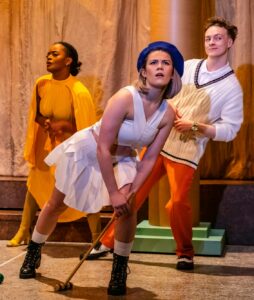The Top 10 Things to consider when you prepare for your Drama School Audition
We asked our resident team what advice they could give to applicants preparing for drama school auditions and, with their help, we’ve put together our top ten tips. From practical considerations when choosing material to looking after your health and wellbeing, here’s what they wanted to share:
- Choose appropriate material
- Research your options – consider more than one course of study
- Prepare your material
- Plan your journey
- Bring refreshments
- Warm up – even for a self-tape
- Remember the panel are on your side!
- It’s not all about the solo audition
- Be yourself
- What next?
Choose appropriate material
This is a big area to cover. To start with, all courses have varying audition/interview processes, so be sure to check what’s required and prepare the right things to meet the criteria. For Mountview, you can find all of the information online here.

Alice in Wonderland | photo by Stephen Glass
If you need to find acting monologues and/or songs, there is some general advice that applies to both – because what you are actually choosing here is a character to play – not just words spoken or sung. Avoid material with lots of shouting and swearing or anything that has a tone which doesn’t change over the course of the monologue. Pieces where a choice is made or give an insight into the way a character thinks and feels work well. Know about the work the piece is taken from so we can see you’ve thought about the journey of the character.
Look for a second piece that contrasts with the first. That might mean a contrasting style of writing or a different situation or idea where the stakes are higher or lower for the character. Once you’ve chosen your material, make sure you understand the context of the monologue in the whole work it’s taken from.
Merryn Owen, Joint Head of Postgraduate Performance at Mountview
For at least one of your pieces, choose a character that is near to your own age and experience, give yourself the advantage of being able to relate to the material. Also, deliver the speech or song in your own voice.
Select a song that you can sing comfortably all the time, not one that you consider to ‘show more’ but that you’re not as comfortable with. It’s difficult to predict how nervous you’ll feel before singing, so avoid creating extra challenges for yourself. It’s unlikely that a positive outcome will rely on a single high note.
Marco Morbidelli – Joint Head of Singing at Mountview
Research your options – consider more than one course of study
Drama school is rigorous and expensive. Make time to research funding. Obviously, we don’t want to discourage anyone from applying, but thinking about fees and living expenses for your course is so important. It might seem impossible, but there is funding available. The Student Loan scheme is available to contribute to most drama school fees but there are also bursaries for some once places are offered. It’s important you know what you’re getting in to, financially, and doing this research at the application stage will help you understand the process as it happens later down the line.

King Lear | photo by Cesare De Giglio
Which course is right for you? Mountview offers a range of training opportunities. Have you considered a Foundation course to get a taste of the training before you commit to three years? Have you considered if Acting or Musical Theatre is the direction you want to take your career? And, if you’ve already got a degree or previous training or experience, perhaps the MA pathway would work for you. All performance courses require you to audition but others may not.
Have you thought about the different ways you can work in the industry? There are specialist courses on offer too. Are you an actor-musician in the making? Or a director? There are advanced courses to train aspiring Producers, Site Specific Theatre makers and Community Theatre Practitioners. Maybe one of those is your perfect fit! There are many ways to get into the industry.
Check out the other courses on offer at Mountview here.
There may not be time for questions on the day of your audition so if there are things you need to find out – this is the time to get that information, so you are fully equipped in advance of your audition.
Prepare your material
Now you have a selection of material, and you are sure which courses you are aiming for, it’s time to get prepared. Know the context of the monologue and where the character is in the journey of the story. Where have they come from? Where are they going?
Preparing your pieces would include reading the full plays your monologues come from and researching the story of musicals your songs come from. Make sure you understand any relationships. That you are aware of the situation you are speaking or singing in. Know what you are talking about – research any references you don’t understand. And of course, thoroughly learn your lines!
Merryn Owen, Joint Head of Postgraduate Performance at Mountview

A Little Night Music | photo by Cesare De Giglio
Your character might exist in a time and place but if it’s somewhere in the real world, take time to find out something about it. There’s endless research you can do and some of the approaches to character are what you’ll learn in your training – stick to the journalistic questions to anchor your thinking. The Who? What? Where? When? Why? And, how?
You might find an online audition bootcamp beneficial and there’s probably still time to find one before your audition. Mountview has both an Acting and a Musical Theatre Online Audition Bootcamp course, you can sign up here.
Also, while you’re getting your audition pieces ready, maybe take time to look at everything else on offer at the different schools. What’s the area like, what’s nearby that you might want to see or do? The UK boasts some of the best performing arts training in the world and our cities are famous destinations, full of history and culture. What else do you want to get out of your time while you’re studying? The surrounding area of our London campus is vibrant and offers an almost endless list of social places and leisure activities. You can also join the Student Union and enjoy student discounts and events in the same way as any UK University student.
Remember, this is a chance to find out if the school is the right place for you. What do you want to know about how we work and our ethos? We recognise that accepting a place at drama school means you’ll spend months or years of your time and a considerable financial commitment; we want you to be happy during your time with us and not just when you’re in classes.
Have a look at some of the other aspects of Mountview on our website here.
Plan your journey
This may sound obvious, but if you are going to an in-person/face to face audition, make sure you know where it is and how long it will take you on the day you’re going. You don’t want the extra pressure of arriving too late or way too early.
Travelling can be expensive too – you might need to budget for it. And if you are travelling a long distance, do you need to find accommodation?
Details of How to Find Mountview can be found here.
Bring refreshments
Audition days can be long and require a lot of energy. You may not feel like eating but having a snack can really help keep you fueled and steady you physically.
There are shops and cafés locally to Mountview and most other schools, but you’ll save money if you bring your own refreshments.
Water is essential, so make sure you have plenty with you. But there’s no need to carry lots with you on your journey in. We have water fountains so you can refill your water bottle. (Make sure it’s got your name on it – there will be lots of others around!)

Legally Blonde | photo by Cesare De Giglio
Warm up – even for a self-tape
We are very used to performers stretching out and making noise in the corridors! You won’t be alone. Don’t go in cold. On the day of an in-person audition we will probably run a warmup session – but even before you send a self-tape – remember the good practice of running through your material and warming up before you start recording. You will probably need to send self-tapes for many schools and they are used in the industry for casting, so it’s a good idea to be prepared and take steps to make the best recording you can.
Here’s a helpful guide to how to film your monologue.
Remember the panel are on your side!
After a successful digital round, you’ll be invited to meet in person. This means you’ll present your material to a panel of our faculty. They aren’t just sitting in judgement, they’re interested in what you have to bring. If they don’t watch every second of your audition, they will probably have been making notes or considering aspects of your performance.
The people you audition for have been there themselves and they appreciate you may be nervous. They want you to do your best and they appreciate your effort to get this far. We aren’t looking for the perfect actor, singer, or dancer, we are looking for people to train.
Merryn Owen, Joint Head of Postgraduate Performance at Mountview
Don’t try and second guess what they are writing or the words they use to you, this isn’t helpful and will only take you out of the creative choices you have made; stay in your process and deliver the best you can do.
Steve Grihault, Head of Acting at Mountview
Teachers on the panel might be taking notes. Don’t let this distract you and don’t try to second-guess what they’re writing. It may actually be good things about you! And, try not to see other candidates as competition. This is difficult because you are after the same outcome and not all of you will get it. However, it can be a lot more useful to think of other people as allies instead of enemies and to wish them well.
Marco Morbidelli, Joint Head of Singing at Mountview
It’s not all about the solo audition
When we recruit a new cohort, we are looking for more than just solo performers. We want to bring a group of people together who will be a company, an ensemble who will support each other and bring a wealth of different skills, ideas, cultural backgrounds and opinions into the mix.
Always be kind and supportive of each other, performance is not a competitive sport but a collaborative one.
Steve Grihault, Head of Acting at Mountview
Show your fellow auditionees the kindness and respect that you want to receive yourself. Show the panel that you are a person that they want to have in the room – engaged, focused and interested. That’s good practice for any interview – but especially for the kind of intense, vocational training courses that drama schools offer.

The Man of Mode | photo by Danny Kaan
Be yourself
You may have heard this over and over again – but we mean it. Your personal attributes and skills are what make you distinct and interesting. And it doesn’t matter what they are – every different thing you bring will enrich the group as a whole once you get your place.
We are looking for a diverse range of experience and potential as these lead to greater collaborations and sharing, you are unique, so bring yourself to auditions.
Steve Grihault, Head of Acting at Mountview
Maybe you are great at a particular sport, maybe you love to sew or read or cook. Maybe you had a career before you decided to train. We are interested in you and what you can do.
What next?
After you’ve auditioned and you get back home, don’t ponder on the day too much. If you don’t find out your result on the day of your audition/interview, the outcome will be sent in a couple of weeks and waiting nervously for the result isn’t a constructive use of your time. Instead, you could read up on your subject, find different material you might use, watch films and plays or listen to new music – or just do the other things you love.
Looking after your mental health and wellbeing is so important. For every performer that gets a job there will be many more that auditioned but didn’t book it. Rejection comes with the territory. It is never personal – it’s not about YOU. And if it doesn’t happen this time – you are welcome back to try again another year.
Applications are now open for all 2023 performance, directing and technical theatre courses so apply now and good luck with all your auditions and interviews!
